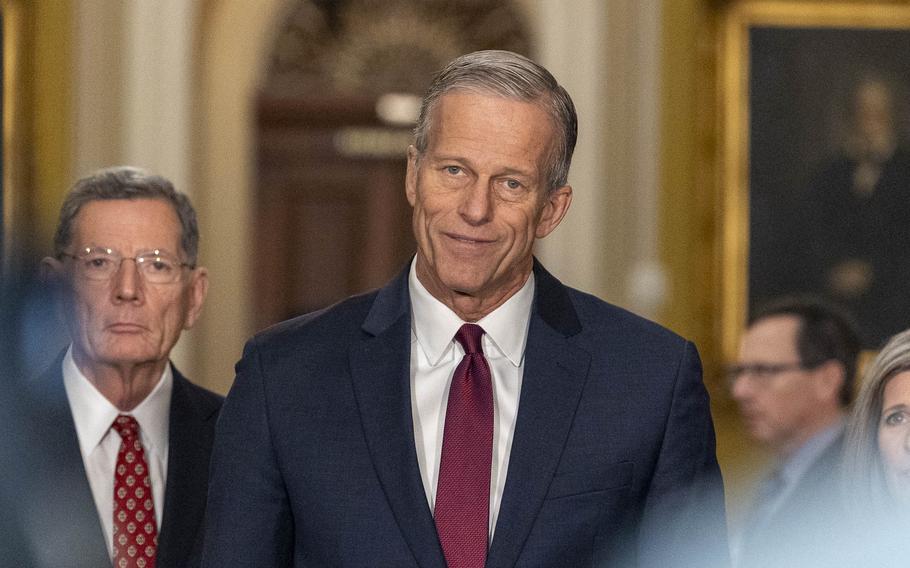
Senate Majority Leader John Thune, R-S.D., during a news conference at the U.S. Capitol in December 2024. (Eric Kayne/Stars and Stripes)
WASHINGTON — The Senate on Tuesday narrowly pushed through a massive tax cut and spending bill advancing President Donald Trump’s domestic agenda that will provide $150 billion in extra defense spending for the Pentagon on top of its annual budget.
Senators voted 51-50 for the measure following days of debate over Trump’s so-called “One Big, Beautiful Bill,” which extends expiring tax cuts, reduces spending on safety net programs and redirects hundreds of billions in funds toward border security and defense.
Vice President JD Vance had to cast a tiebreaking vote for the legislation to pass the upper chamber.
The bill next goes to the House, where it faces an uncertain fate amid staunch Democratic opposition and pushback from some Republicans who want steeper spending cuts. Lawmakers hope to get the final measure to Trump’s desk by July 4.
The Defense Department is counting on $113 billion of the $150 billion included for defense in the legislation to help fund its $961 billion budget request for fiscal 2026. Without the additional funds, the request keeps spending for the Pentagon flat from the current year.
Lawmakers have outlined specific priorities that the extra money should be spent on. They include nearly $30 billion for shipbuilding and improving the maritime industrial base, $25 billion for munitions production, $25 billion for Trump’s Golden Dome missile shield and $9 billion for housing, health care, child care and education for troops.
About $1 billion is being allocated for military operations on the U.S.-Mexico border — $4 billion less than the House had passed in its version of the bill.
Efforts by Democrats to add a host of amendments to the legislation failed.
Sen. Richard Blumenthal of Connecticut attempted to prohibit the Pentagon from using any funds to retrofit the luxury jet that Trump accepted as a gift from Qatar for use as Air Force One.
Sen. Tammy Duckworth of Illinois, an Iraq war veteran, tried to ensure Supplemental Nutrition Assistance Program benefits, formerly known as food stamps, would not be reduced or terminated for veterans, homeless people and other individuals.
The Senate’s bill eliminates exemptions for veterans from the program’s existing work requirements. The Congressional Budget Office estimated 270,000 veterans would be cut from SNAP benefits in a typical month under the legislation.
About 8% of veterans are SNAP recipients, according to the Center on Budget and Policy Priorities, a left-leaning think tank. Some are disabled from service-connected injuries and unable to work.
“Donald Trump and Senate Republicans are trying to snatch away these critical safety net programs like health care and SNAP from countless families,” Duckworth said. “I’m pissed off that they would look me in the eye on the Senate floor and then block this critical proposal to help protect so many Americans from going hungry. It’s shameful.”
Sen. Tim Kaine, D-Va., failed to win support for his amendment protecting veterans working for the federal government from mass firings. Former service members make up 30% of the federal workforce.
Republicans praised the bill on Tuesday for bolstering the military’s capabilities at a time when threats from adversaries such as China, Russia, Iran and North Korea are increasing.
“This historic legislation includes funds to jump-start the Golden Dome system to protect the homeland, increase our supply of munitions, rapidly advance unmanned ships and drones, enhance military readiness, reestablish deterrence and advance shipbuilding to produce a 21st-century naval fleet,” said Sen. Roger Wicker of Mississippi, the Republican chairman of the Senate Armed Services Committee.
Sen. Mitch McConnell, R-Ky., however criticized the Pentagon’s reliance on the bill to fund its budget and said the reconciliation process, which allowed Republicans to pass the legislation with a simple majority vote, was not meant to serve as a replacement for a continuously growing budget.
“Reconciliation was an opportunity to make an urgent, additive investment on top of a steadily increasing base budget, not an invitation to offload major annual priorities to a one-time injection of funds,” he said. “Largely missing this opportunity makes the Congress’ work to secure robust top-line defense funding even more important.”